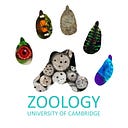Q&A with Professor Derek Smith
Can you tell us what your research group actually does?
We are evolutionary biologists who study pathogens, and their interaction and co-evolution with their hosts. Influenza is our first love. It changes in front of our eyes, and is very easy to manipulate in the laboratory so experiments are relatively easy. Furthermore, there is a worldwide network of thousands of people who track the evolution of the virus for the purposes of keeping the flu vaccine up to date. So not only do we get to do experiments to figure out the basic evolutionary processes of the virus, we also get to see what happens in the wild, in close to real-time, to test our analyses and predictions. In addition to this science, my group also reports to the World Health Organization on our results, and for the last 20 years, I have sat on the committee at the WHO that chooses the strains of flu that go in the vaccine. We do related research on influenza in other animals, and also on other pathogens such as dengue.
How did you get into this area of research: Were your parents really into germs?
Germs have always fascinated me, wondering what they are doing in our bodies, and how they live. They seem such basic things, governed by raw evolutionary processes, and in the case of RNA-viruses, the types I’m most interested in, evolving at a substantially faster rate than their hosts. How do we, and other animals deal with this, what effect does it have on us? But strangely I studied computer science and how our brains work. During the AIDS pandemic in the 1980s I realized that I really wanted to work on pathogens, I wanted to make a difference. Here was a pathogen that changed, that evolved, that our immune system learned how to recognize, only for the pathogen to change again. It seemed like such a fascinating process, and I loved the idea of understanding it well enough to interfere on the side of the humans.
Has your group been involved in Covid-related research during the pandemic?
Yes, since the variants emerged in December 2020 I and the whole group have been fully involved. That is our primary area of expertise. Tracking the evolution of existing and newly emerging variants, trying to understand the evolutionary processes involved, and using that science to try to predict what will happen next and what we should do about it. Will we need, for example, to revaccinate high-risk individuals, and if so with what strain. Consequently in the UK I chair a subgroup of SAGE and am on some other SAGE subcommittees, all related to vaccine updates. Similarly in the USA. It is a 6 am to 10 pm job most days for the whole group, and some ex-members of the group, who did their PhDs with us and who are now off as postdocs or running laboratories elsewhere. Indeed, among the stress and responsibility of this, it is an enormous pleasure to witness the commitment and brilliance of all these young scientists and to know the world will be in better hands when I’m off on the beach.
How do you respond when people ask what you are doing in a Department of Zoology when you don’t study animals?
Sometimes I tell them the story of how one day I had a meeting with our wonderful ex-Head of Department, Malcolm Burrows. He was reading a press-release when I sat down in his office, and asked if I minded to wait a couple of minutes while he finished. He was clearly really enjoying what he read and when he had finished he proceeded to tell me about it. It was a story, he said, about work that someone in our department had done on Pholcus phalangioides. Then he stopped himself, looked up at me from the article, and before proceeding to tell me about the rest of the story said “to you Derek, that’s a Daddy Long Legs.”. It was a good moment.
What would be your ideal night out?
I would have to explain a lot about Argentine Tango to answer this question. It’s not like what we know from Strictly.
In “Derek Smith, The Musical” who would like to play your part?
Tom Waits. Although I have loved other music more at different times, I loved Tom’s music the longest, by far. Plus, when he acts, I love the strangeness of how he plays his characters. If Tom were not available, and if I’m allowed a dead person, it would be Anibal Troilo, a tango orchestra leader and musician from the 1930s through into the 1970s, whose music and voice I adore. But mostly, because I feel a real connection between the way he ran his orchestra and interacted with other orchestras, and the way I do that in science.
